
WHAT IS CBD?

CBD is one of the primary natural compounds found in the Cannabis sativa plant.
Unlike THC (tetrahydrocannabinol), which is another primary compound from the same plant, CBD is non-psychoactive, meaning it doesn't produce the "high" commonly associated with cannabis. Here's a breakdown of its key aspects:
WHAT IS CBD?
CBD, or cannabidiol, is one of the primary natural compounds found in the Cannabis sativa plant. Unlike THC (tetrahydrocannabinol), which is another primary compound from the same plant, CBD is non-psychoactive, meaning it doesn't produce the "high" commonly associated with cannabis. Here's a breakdown of its key aspects:
SOURCES: While CBD can be extracted from both the marijuana and hemp varieties of the Cannabis sativa plant, most commercially available CBD products are derived from hemp.
Potential Therapeutic Benefits: CBD has been researched for various potential therapeutic applications, including:
- Pain relief: Many users take CBD products to help manage chronic pain.
- Anxiety and depression: Preliminary studies suggest CBD may have anxiolytic and antidepressant properties.
- Epilepsy: The U.S. FDA has approved Epidiolex, a CBD-based drug, for treating certain forms of severe epilepsy.
- Anti-inflammatory properties: CBD is being researched for conditions like arthritis due to its potential anti-inflammatory effects.
- Sleep disorders: Some individuals use CBD to help with insomnia or other sleep issues.
Safety and Side Effects: Generally, CBD is considered well-tolerated with a good safety profile. However, some users might experience side effects such as diarrhea, changes in appetite, fatigue, or interactions with other medications.
Legality: The legal status of CBD varies by country and even within regions of countries. In the U.S., for instance, hemp-derived CBD with less than 0.3% THC became federally legal under the 2018 Farm Bill, but laws can vary by state. It's crucial to check local regulations when considering the purchase or consumption of CBD products.
Consumption Methods: CBD is available in various forms, including oils and tinctures, edibles, capsules, vapes, topicals, and more. The choice often depends on personal preference and the desired effect. Research and Clinical Trials: While many users report benefits from using CBD, and some preliminary studies support its potential therapeutic properties, further research and clinical trials are required to determine its full range of benefits and potential risks.
Misconceptions: Due to its association with the cannabis plant, CBD sometimes faces misconceptions. It's essential to differentiate between CBD and THC, especially in terms of psychoactive effects.